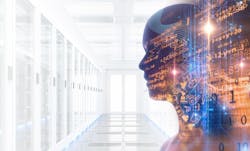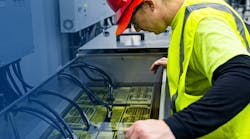Data Center 2020: The Year of Artificial Intelligence
Marc Cram, Director of Sales, Server Technology, highlights as artificial intelligence continues to reshape the world of business, businesses will be relying on AI to reshape the way their data centers operate.
Marc Cram, Director of Sales, Server Technology
Artificial Intelligence continues to reshape the business computing landscape. It changes the way businesses solve the problems they face in terms of efficiency, productivity, and profitability. As we get the new year under way, Artificial Intelligence (AI) is making its presence known both publicly and privately, both in the way that we experience it as consumers and as we continue to experience it as professionals in the mission critical industry.
Thus far, AI leadership in the business world has taken different forms, and 2020 will see the continued maturity of these known applications, as well as the development of new ones. These applications are as varied as the industries that have been involved in the development of new applications of the technology.
Retailers will continue to learn about what a consumer wants by following his digital path through a department store. Many retailers have invested in sensors that can track consumer patterns for particular products. If a product flies off the shelves or just the opposite, or is picked up but then put back, it gives retailers clues about behavior and allows them to make adjustments within the retail environment in order to increase sales. In 2020, the practice will become more common, which will drive the continued integration of data collecting devices and sensors nearer and nearer the consumer.
Likewise, in the automotive industry, 2020 will mean the continued journey down the road of making autonomous vehicles a reality. As car companies such as Tesla Motors continue to get consumers in the driver’s seat of driverless vehicles, the edge computing platforms and 5G networks that will be required to enable real-time data-transfer will continue to be pushed and pulled into maturity. Many of the required data centers have been in development for years. As such, the major manufacturers competing for space in this new market will continue to make investments in the digital infrastructure that will be required to make automation a safe reality.
All of these CPU-based servers need power, and more servers will be needed to meet the processing requirements of the predicted proliferation of data.
By digital infrastructure I am referring to the transportation pathway for data. From sensor to network to data center, each stop is required to support the retail, manufacturing, automotive, and other business applications of AI. On the data pathway, the data center stop seems to be undergoing the biggest change. Artificial Intelligence is a double-edged sword that makes life both tougher and easier inside the walls of most computing facilities.
The application of AI has created ever more data, which taxes the server, storage, and network devices housed in data centers. This is especially true for those not designed with the required flexibility to support change. Additionally, HPC is the common solution for AI-induced problems, and their high demand for power and cooling kWs do not appear to be diminishing in the near future. In lieu of HPC, some operators will continue to rely on tried-and-true conventional CPU-based servers. But as sensors and networks gear up, the fundamental law of physics which states that for every action there is an equal and opposite reaction, the reality for data centers is clear. All of these CPU-based servers need power, and more servers will be needed to meet the processing requirements of the predicted proliferation of data.
2020 will see the continued application of AI for solving the power and cooling issues its own rise has created. As the fruits of Google’s Deep Mind AI implementation are shared throughout the data center industry, we can look forward to more data centers lowering their PUEs through better, data-focused management of their cooling infrastructures. Even for those operations that are a few years away from AI-managed pumps and cooling towers, we will continue to see more reliance on rack-level power in the form of intelligent PDUs with remote power management and data center environmental monitoring capabilities. It’s where cooling sensors will communicate in real-time with cooling management systems to yield the highest possible efficiencies.
As Artificial Intelligence continues to reshape the world of business, businesses will be relying on AI to reshape the way their data centers operate.
Marc Cram is Director of Sales, Server Technology, highlights as artificial intelligence continues to reshape the world of business, businesses will be relying on AI to reshape the way their data centers operate. Server Technology, a brand of Legrand.
At Legrand, we are committed to providing power, management, access, and control solutions for the artificial intelligence and data center infrastructures that impact the lives of billions of people around the world. Learn more about AI and powering the next revolution here.


